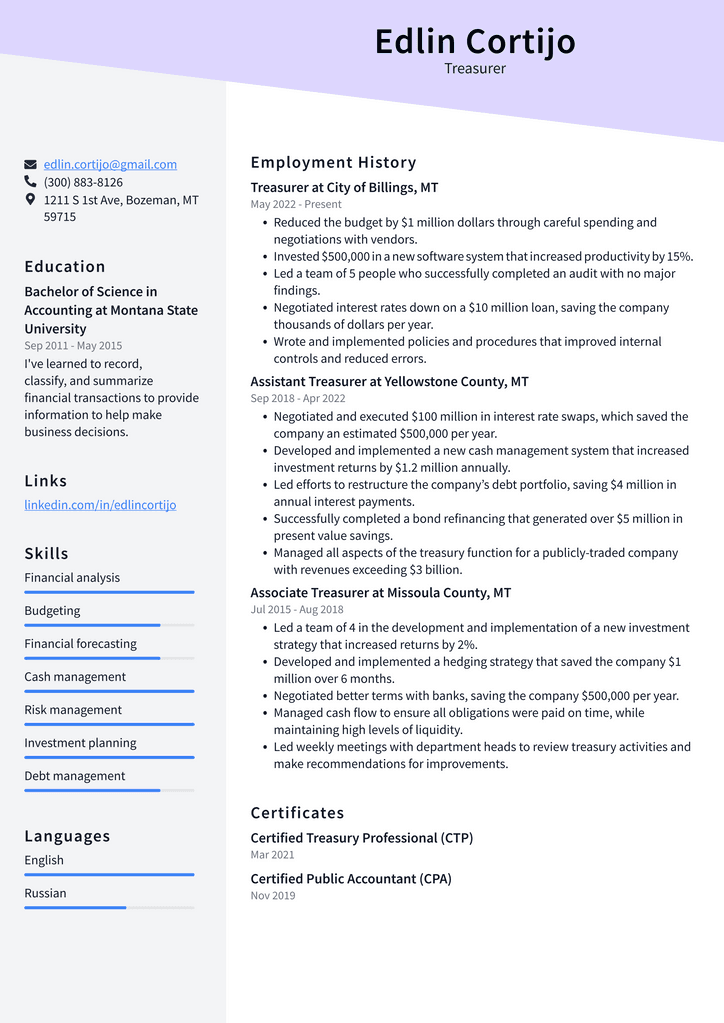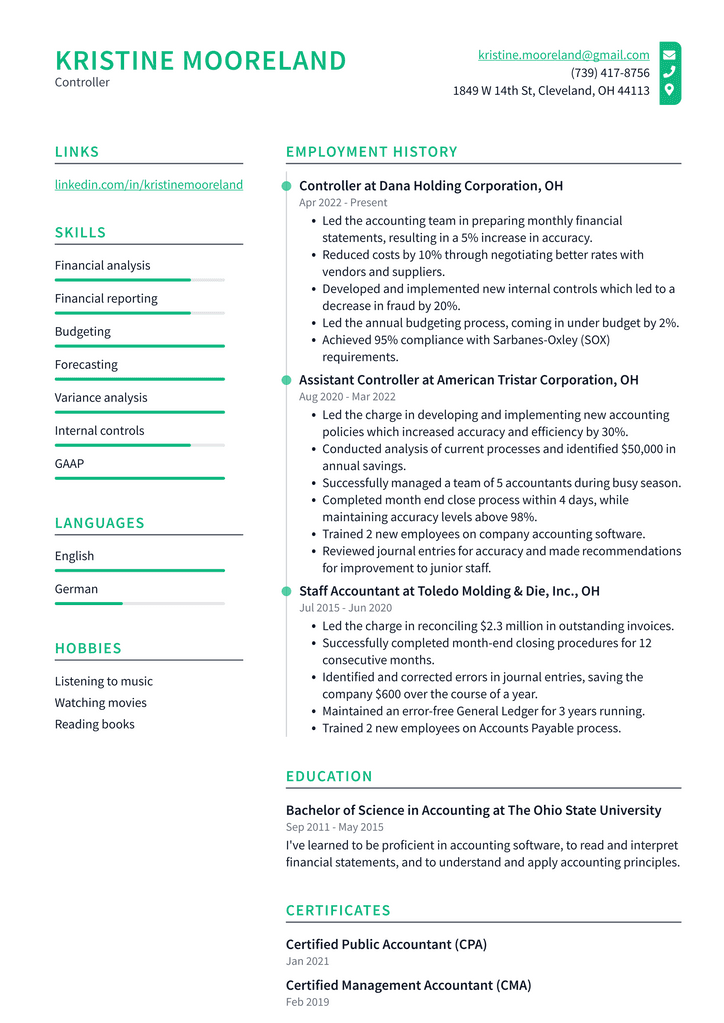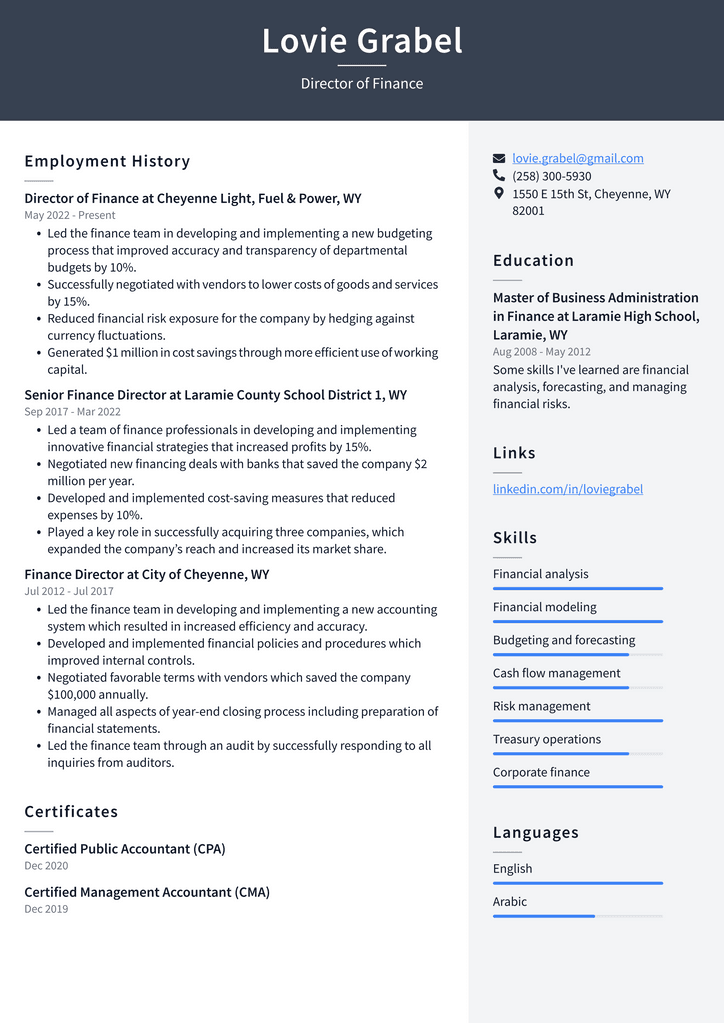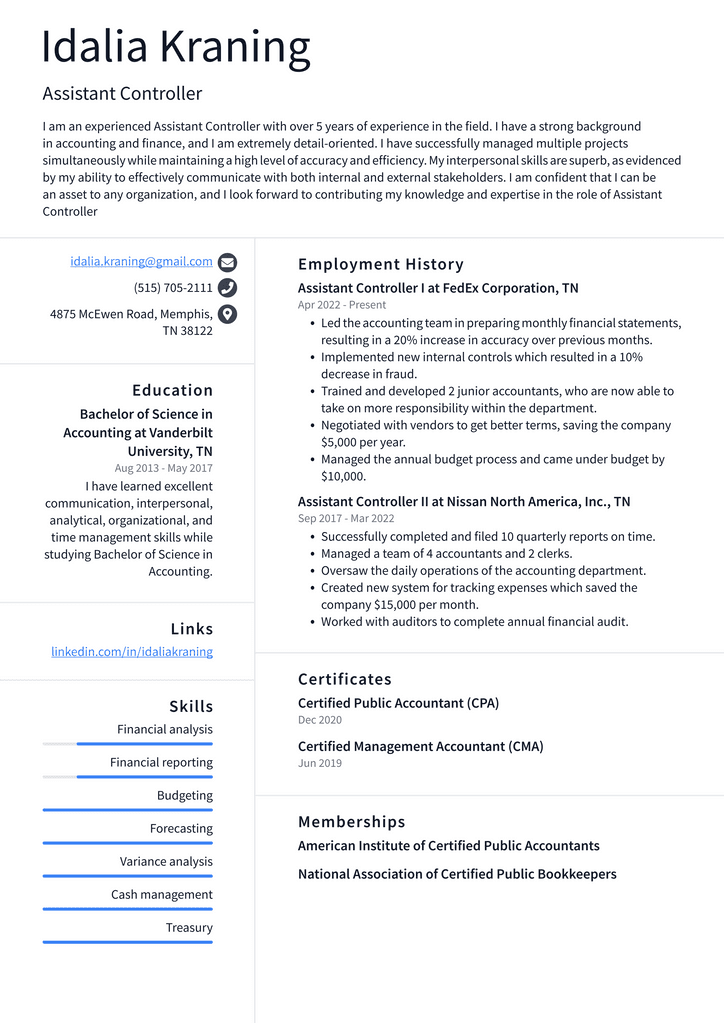When you set out to write your resume, you’ll find that the task before you is pretty daunting. Even with all your experience in finance and accounting, creating an outline might seem impossible. If you’re currently looking for a job in the financial or accounting sector, you have an impressive working history that will help open up doors for new opportunities. But even if your current role doesn’t involve any financial tasks, it’s still advisable to create a resume and tailor it to the specific positions you want to fill as finance director requires someone who can think outside the box and handle unexpected challenges with ease. Working as an accountant requires patience and attention to detail. In this blog post, we’ll explore simple tips for making your resume stand out from the rest and show hiring managers what you have to offer their company.
Finance Director Resume Example

Download This Finance Director Resume as PDF
Treasurer Resume Example

Download This Treasurer Resume as PDF
Chief Financial Officer (CFO) Resume Example
-resume-example-OtRg1-724w.png)
Download This Chief Financial Officer (CFO) Resume as PDF
Vice President (VP) of Finance Resume Example
-of-finance-resume-example-Abjb2-724w.png)
Download This Vice President (VP) of Finance Resume as PDF
Controller Resume Example

Download This Controller Resume as PDF
Director of Finance Resume Example

Download This Director of Finance Resume as PDF
Assistant Controller Resume Example

Download This Assistant Controller Resume as PDF
The Basics of Writing a Resume
A resume is a document you use to summarize your job experience, skills, and education, as well as any other information that will help a hiring manager understand why they need to consider you for the position. A resume should be concise, well-formatted, and easy to read. It should also showcase why you’re the right candidate for the job, especially if you’re applying for a finance job. The best resume format is the standard (chronological) resume layout. It’s the most common type of resume and the easiest for hiring managers to read. There are other resume formats that you can use, but these are less common.
An example of this is the functional resume format. This is used if you’ve had long periods of unemployment or if you’re changing fields or professions. The main difference is that you focus on your skills and achievements instead of your work history.
Use action words in your resume
The biggest mistake that most people make when writing their resumes is using passive language. This means that you register your resume so that you are not the person who is taking action, but rather, you’re the one who’s receiving activity. Easy example: “I was responsible for…” as compared with, “I managed a team of 15+ employees and was responsible for their performance reviews.” You’ll notice that the first example makes you sound a bit weaker and does not invite the hiring manager to read more about you. The second example, however, makes you sound like a strong candidate and someone ready to take action. If you want to grab the hiring manager’s attention and make your resume stand out from the rest, use action words when describing your tasks, responsibilities, and achievements.
You’re the expert, so showcase it!
If you’re applying for a job in finance, the hiring manager will be looking for someone knowledgeable in financial matters but also has a strong background in accounting. If this is an area that you’ve been working in for years, don’t be afraid to state it in your resume. So put, if you have knowledge that most people don’t have, you should be proud to showcase it in your resume. Hiring managers want to hire experts in their field who can make an immediate impact. If you’ve been working as an accountant for the last ten years, you’re an expert in accounting. If you’ve worked in finance for five years, you’re a finance expert. Don’t be shy about saying so!
Stay current and showcase your skills
If you’re applying for a job in finance, you’re expected to know the latest trends in the field and be familiar with the latest technologies and software. If you’ve worked in accounting for five years, you’re expected to be familiar with the latest accounting software. If you’ve been working with the same company for many years and they’re not keeping up with technological changes, then you’re expected to be familiar with the latest trends in your field. However, if you’ve been working in a different area for the last few years and are now looking for a job in finance, hiring managers will see this as a negative thing. If you’ve been working as an accountant for the last few years and are now applying for a job in finance, don’t be afraid to mention it in your resume.
Don’t include a job description or responsibilities
If you’re applying for a job as an accountant, don’t include in your resume a job description such as “Responsible for reviewing and entering invoices.” Instead, you should write something more general, such as “Accounting manager responsible for reviewing and entering invoices.” If you’re applying for a job as a finance director, don’t include in your resume a job description such as “Oversee daily operations and report to the board of directors.” Instead, you should write something more general, such as “Finance director overseeing daily operations and reporting to the board of directors.” Don’t write a job description or a list of your responsibilities in your resume. Instead, focus on your achievements, what you’ve done in your field, and why you’re the best candidate for the job.
Summing up
If you’re currently looking for a job in the financial or accounting sector, you have an impressive working history that will help open up doors for new opportunities. But even if your current role doesn’t involve any financial tasks, it’s still advisable to create a resume and tailor it to the specific positions you want to fill. We hope that this article has inspired you to create a resume and helped you understand what goes into making a great one. If you follow the tips that we’ve outlined above, then you should be able to create a great resume. So now that you know what to do, sit down, get some paper and create a resume that hiring managers will want to read! And once you do, don’t forget to use our checklist to ensure your resume stays error-free!